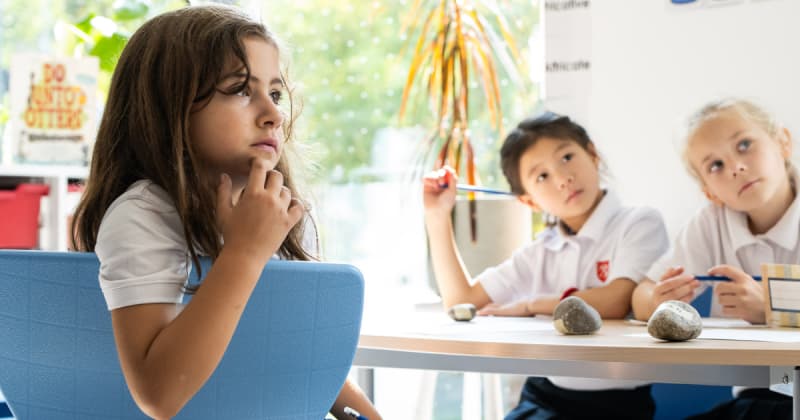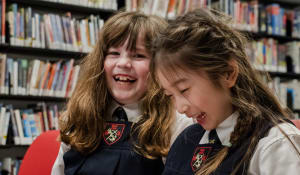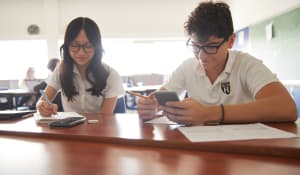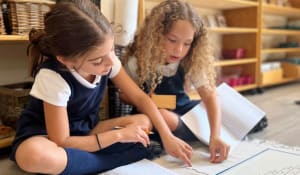This includes embracing inquiry-based learning and encouraging students to dive into questions that matter to them. “We don’t have one teacher in one class doing the same thing,” says Henricks. “It’s about asking: What are you interested in? Where do you want to go deep?”
For example, Grade 5 students studying social sciences might become curious about animal welfare. That could evolve into researching how northern Canadian communities protect sled dogs, connecting with real-life experts along the way. “Learning to ask the right questions and then engaging experts is crucial,” Henricks says. “It’s an iterative process.”

Leadership is another iterative process cultivated early through programs like Mindful Mentors, where Grade 5 and 6 students research and teach mindfulness practices to younger students. Older students also design spirit events such as fun days or school-wide playdays, which reinforce a strong sense of connection.
Emotional intelligence and resilience are equally important. These skills are developed through the school’s LINCWell approach: Learning, Individualization, Nurturing, Creativity, and Wellness. A dedicated LINCWell teacher works with Junior School classes, introducing tools that foster a growth mindset, self-regulation, and stress management. “We want students to take risks, grow, and even fail in a supportive environment that equips them with tools to bounce back,” says Henricks. “Having voice, choice, and agency builds self-reliance and cultivates the mindset needed for lifelong learning.”
This program, now in its 16th year, is informed by school-based research. “Once students develop routines that work for them, they use them independently, without prompting,” Henricks explains.
Equity, diversity, and inclusion (EDI) is another school cornerstone aimed at promoting community. St. Clement’s has a full-time EDI Director and an integrated curriculum starting in Grade 1. “Our goal is to ensure that every student feels seen and heard, whether it’s through classroom discussions, school assemblies, or the books in our library,” Henricks says. Grade 1 students might begin by exploring their name stories and learning about visible and invisible aspects of identity, laying the foundation for inclusive thinking.
Beyond the classroom, co-curriculars enrich learning. Students join athletics like soccer or swimming starting in Grade 4, or explore creative outlets including robotics, award-winning choirs, or traditional Chinese dance. “It’s all about giving students the space to follow their interests,” Henricks adds.

With an almost 125-year history, St. Clement’s seamlessly blends tradition and innovation. Henricks highlights that they’ve expanded both their library and robotics design spaces: “We recognize the importance of honouring our traditional academic roots, but we also know how crucial it is to innovate and look forward.”
At its heart, St. Clement’s Junior School offers a personalized, progressive education where leadership is nurtured, and every student is empowered to be their authentic self. “The power of our model is that we grow together,” Henricks says. “By starting in Grade 1 with inquiry, well-being, and EDI, and sustaining that learning to Grade 12, we create a powerful trajectory of growth.”
In a world that demands adaptability, empathy, and confidence, St. Clement’s prepares its youngest learners not just to succeed, but to lead with purpose.























